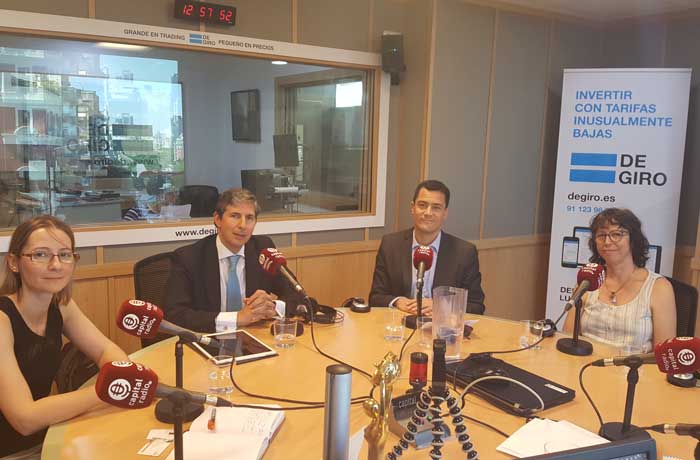Vía Célere Innovation Debate: Valuation of Intangibles in the Real Estate Sector
Last week at the Vía Célere Innovation Debate, on the Real Estate Investment programme at Capital Radio we discussed the topic of Intangible Capital. Intangible Capital is something that has not been developed much in Spain if we compare it with other countries surrounding us such as the US, United Kingdom, France or Sweden. However, intangible aspects are increasingly fundamental for companies and, all the more so, if possible, for the real estate sector. Not only because of the past, with financial crises and reputations, but also because of the future, when we talk about smart cities, sustainable habitats, climate regulation, etc.
Miguel Pinto, Strategy General Manager at Vía Célere believes that companies in the real estate sector are not aware. “At Vía Célere we were not until very recently but now we have begun to be aware of the importance of intangible capital and not only that, but we are convinced that within two years it will be a differentiating element in the property market. This is why it is going to be very important in these two years for us to head in the right direction in this aspect. Our objective now is to diagnose intangible capital in order to measure it and report on its value. At Vía Célere we want to become a benchmark of intangible capital in the real estate sector”.
It is obvious that there is a big difference between listed companies and companies that are not listed. “For companies that are in capital markets and that have greater transparency in their valuations, the value of intangibles is of great weight in their balance sheets. In fact, in the last 40 years in the American market the weight of the value of intangibles in companies has gone from 20% to 80% at present. Therefore, a change and a transformation are taking place in this aspect,” said Jaime Silos, Corporate Development Manager at Forética.
In the same vein Sonia Moreno, head of certification at GBCe, confirmed this big difference “It is very different how the importance of intangible capital is valued by the large Ibex companies. Even companies that come from international groups to Spain already have policies in place from their parent companies that demand this type of requirement. In Spain, the big companies that value it are those that are in the international arena and as for the rest, they are still considering the situation so there is still a long way to go”.
However, in terms of sustainability, social aspects and good governance, in Spain the results are more positive. According to Jaime Silos. “Of the 35 companies that are in the Ibex-35 there are five companies that are leaders in their respective sectors worldwide in terms of sustainability and that is the case, first due to awareness and secondly, due to principles of good corporate governance in these companies“
In this respect Paula Rivas, Technical Manager at GBCe, stated that “companies have gone from not knowing what the valuation of intangible capital is and not paying attention to it, to being aware that it involves an added value for their products and that it is time to start measuring it Therefore, we are currently undergoing that revolution with exponential growth. We have a base that is already advanced by having technological tools that help measure these intangibles, and this is also helped by pressures from Europe and the United Nations regarding the objectives set in sustainable development and the EU priority objectives, which are forcing us to take into account many things like climate change or energy efficiency”.
If we look at intangible capital in the technological field, Noelia Escobar, a founding member of AFIDI and Head of Institutional and Intangible Relations at Incotec, points out that “for two or three years companies have invested in R&D&I but now it is time to collect the results of that investment both financially and technologically. To do this, we have to focus on a variable: the results and to see if I am capable of being recognised by the market because of a differential value. We have to focus on making the results of my innovation process profitable. There are studies that point out that if we focus on the scope of results and start to analyse the knowledge and concepts of patents, industrial products, industrial design, etc., but, above all, for this result to reach the market and in this way, GDP in Spain could increase by 6%. There are other countries such as France and Switzerland where the GDP has increased to twice this, 12%”.
One thing all speakers were in agreement on is that in the real estate sector there is a major challenge in the housing stock that comes from refurbishment since most of the buildings do not meet these challenges of sustainability and energy efficiency and ultimately this is where most of the population is living. The challenge therefore lies in providing this entire population with buildings that are energy-efficient but also in a way that is healthy and offers them the benefits that they would have with a new building.


